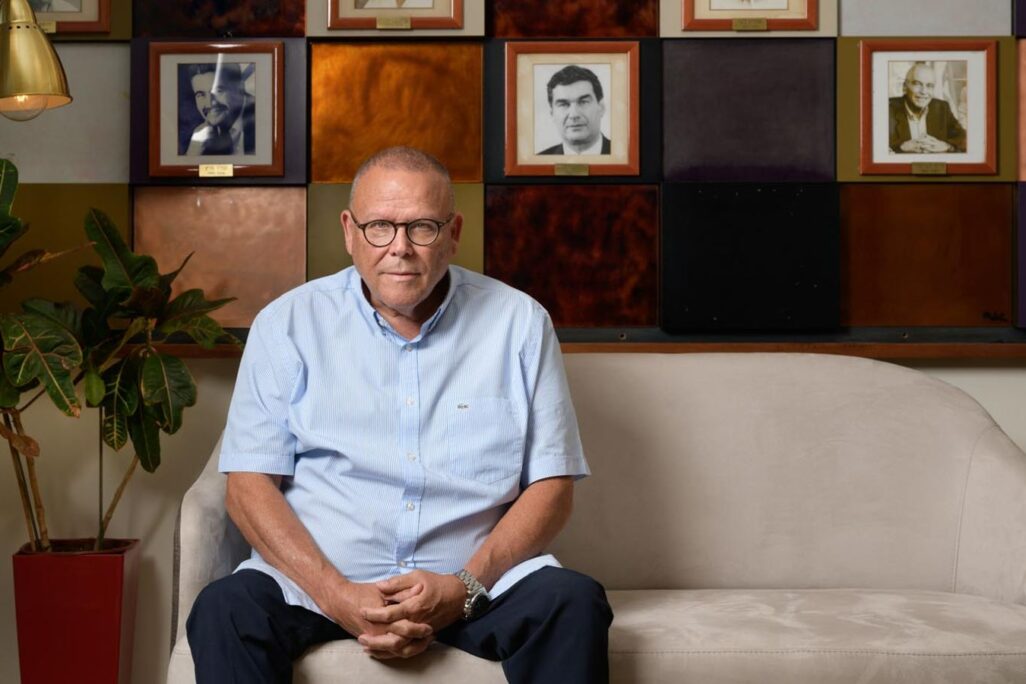
In the wake of his landslide victory in the recent elections to head the Histadrut, Israel’s largest federation of unions, Arnon Bar-David sets down two key challenges for the organization: raising the minimum wage; and a framework agreement for increasing the wages of hundreds of thousands of workers in Israel. There’s also a third challenge: increasing the number of the federation’s members from 800 thousand to one million.
Are you feeling a certain relief after winning this election?
“There are no easy days in my job. Look at the crazy times we are operating in now. There’s yet another national election to deal with, there’s inflation, the [rising] cost of living. We have a state that has money but doesn’t spend it on its citizens.
“We have a public of workers to care for, and disadvantaged populations to look after. There’s a long, hard road ahead in this position as chairman of the Histadrut in this new term. I hope we’re up to the task.”
What do you tell workers and the disadvantaged sectors about the rampant inflation, about the price hikes?
“We are constantly working on providing solutions. Every agreement we make is meant to increase workers’ wages. Despite the current difficult times, we entered into nearly 800 agreements in the public and private sectors, for hundreds of thousands of workers.
“Via the package deal, half a billion shekels went to the sectors with the most disadvantaged workers in the economy in the past six months. We promoted a lot of sectors that had been neglected for years. Hospital and HMO employees; administrative and housekeeping workers; health workers; social workers, for whom we’ve reached amazing agreements; we’ve led reforms that have improved both service and wages at the Electric Corporation, at Mekorot [Israel’s water company] and at the ports; and with the railway too, we’re nearing the signing of the thorniest and most complex agreement.”
Is a framework agreement, one that would raise the wages of public sector employees, going to be achieved soon? Is it within reach?
“That is my prime objective. I have two key objectives: one, the framework agreement, which is currently facing difficulties due to the government being dissolved, but we’re looking for creative solutions. And the second issue is raising the minimum wage, which is also currently problematic since the Knesset has disbanded, and we’re seeking solutions to raise it some other way, maybe through an extension order. We’re currently in the process of handling that. An interim government doesn’t mean the government can’t govern and can’t do anything.”
“In the framework agreement, I have an idea that could solve the dissolved government issue. But I should qualify this by saying that if I find I can’t provide solutions by way of negotiations and talks and proposals I can make, we’ll have to take to the streets”.
If there’s no agreement, will you shut down the economy?
“If we don’t make any breakthrough and if I see we’re not making any progress – because I consider this breakthrough a war on the mounting cost of living and on inflation – we’ll fight.”
How much time are you giving this course of action?
“Right now I’m giving it till the end of August. My deadline is September 1. There may be collaboration with the teachers. We’ll see if we can achieve progress by a different way of negotiating.”
The start of September is your deadline for the start of negotiations or for reaching a signed agreement?
“By that time I want to already see the results of an agreement. It’s not beyond reach, it’s attainable.”
You’d like to have a complete framework agreement, or a temporary one until the next government is formed?
“There are two options. Either I go for a complete framework agreement, which is a bit more problematic during an interim government, or for a certain agreement that an interim government can adopt, which would compensate workers for the wage erosion.”
A one-year agreement?
“Something in that ballpark. That’s part of the solutions.”
By how much would you like to raise wages?
“I’m not going to get into the numbers right now. A significant wage increment is clearly needed to counter inflation and the cost of living. If the kind of framework agreement I’m envisioning is signed, it’s going to actually provide a kind of compensation to almost the entire economy, because at the end of the day, almost everyone is linked to that.
“I expect the government to go along with us on this. We’ve been very responsible these past three and a half years, and during COVID-19. We stabilized the economy through the package deal. In a single quarter, the state covered all the deficits that had formed during COVID-19. So now I expect the state to reach into its pocket, spend some of the budget surpluses and give workers in the Israeli economy their due.”
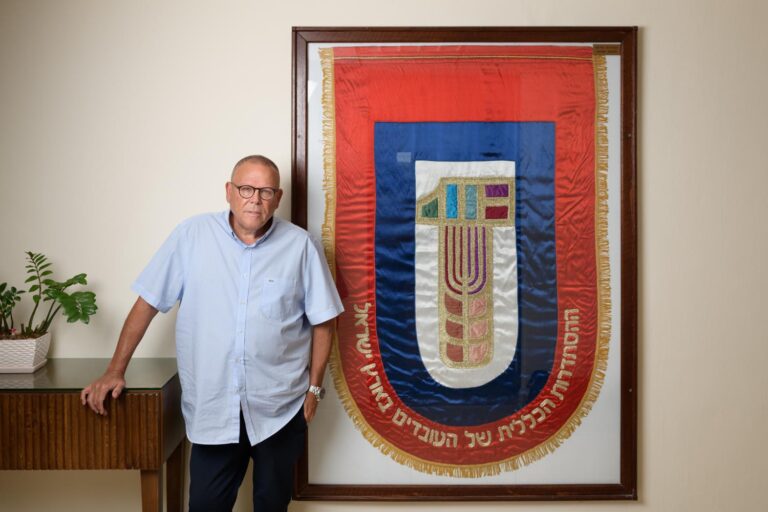
Have you discussed this with the prime minister?
“Prime Minister Lapid took office a week ago. Right now he’s got his hands full with Biden. I’ve been in contact with him and will meet him next week. The cost of living is a highly problematic point. I expect the prime minister to understand that. I’m not going to let this country become a rich state that has insane excess revenues that are only increasing every month, while its workers and citizens are poor.”
What came of your conversations with [Finance Minister] Lieberman on that point?
“Lieberman is aware of that, but right now this hasn’t been moving as fast as I’d like. That’s why I’ve set that deadline of September 1, so that we could move things forward and try to formulate solutions. If we can’t, we’ll have to break through some other way.”
“I know Yaffa, she’s a top-notch labor leader”
The Teachers Union is not part of the Histadrut led by Bar-David, but the two unions often collaborate. In the last week of the school year, the Ministry of Finance strove to break up the teachers’ strike by using the kindergarten assistant teachers to substitute for striking teachers. The Histadrut chairman, whose purview of leadership includes the kindergarten assistant teachers, prevented that.
“The attempt to put the education system’s burden on the backs of the assistants will not succeed," Bar-David says.
Do you support the teachers’ cause?
“Teachers’ wages must be raised. It’s a highly important profession. Maybe some reform should be made, the profession should be given better treatment. The kindergarten assistant teachers are part of that system, they’re my responsibility, and I look after them while these steps are being taken.
“This is about a lot of money that the state already understands has to be invested. Eventually we’ll have to get that money, and teachers’ wages in my view are something that has to change. We’re currently in a politically problematic time, we’ll have to see how things progress and where they go. There are balances here between all labor unions; it’s not a simple thing, but I expect that teachers’ wages can be improved and remedied.”
What do you think about the smear campaign taking place against Yaffa Ben-David because of the fight she’s leading?
“Smears are not the way to go about it. First of all, what they showed as her salary isn’t her salary. We labor leaders are always bad mouthed to some extent. I know Yaffa, she’s a top-notch labor leader. I trust her.
“I should also say that it’s her right to have her son’s wedding whenever and however she wants. Nobody planned the wedding in advance to take place on the eve of the strike. Union leaders have private lives of their own. This can’t be made part of the work.”
How does the media treat you? Plenty of smears?
“Actually, no. Depends on the outlet. Media outlets have their agendas, and some are more evident. I think some of them are missing the change that the Histadrut, its organizational DNA, its transparency, service orientation and its management are going through.
“We’re transparent. We’re the only entity to have already filed financial statements. No association has filed them like we have. You can verify that with the Registrar of Businesses. We’ve done the filings, we’re transparent, and we have no problem with that. That’s part of the change that the Histadrut is undergoing. But they don’t care about all that. They’re just going through the motions.”
“Biden’s an amazing man who comes from within the unions”
The interview with Bar-David was held on the day of US President Joe Biden’s visit to Israel. The Histadrut chairman says he met Biden in the past and still feels a deep appreciation for the man dubbed the “pro-unions president” by Americans, and that he brings up the importance of organized labor and the labor unions in almost every speech he gives.
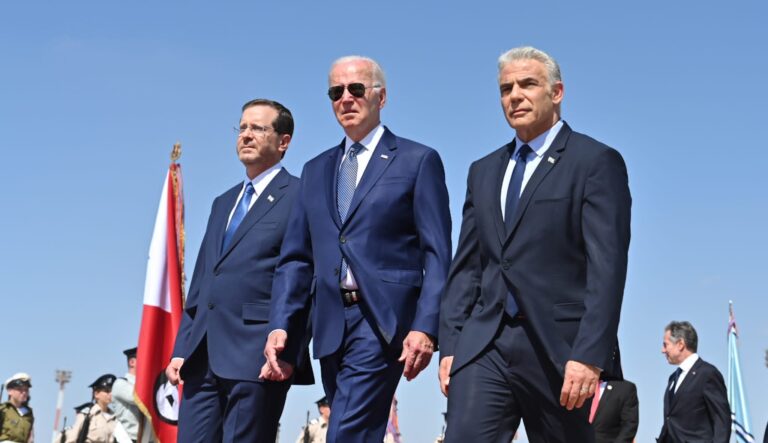
“Biden’s an amazing man who comes from within the unions,” says Bar-David. “I remember he kicked off his campaign in the Democratic Party primaries by giving a speech to firefighters. He even invited a female firefighter to stand next to him at his inauguration as a sign of his appreciation to public sector employees.
“I’m thrilled that the president of the United States, leader of the world’s most powerful nation, advocates for so much support for unions. I think professional unions around the world are changing.
"History’s a pendulum. Sometimes the right has the upper hand and other times the left. Today the pendulum swings ever so slightly to the left. If professional unions around the world take the right course of action – as we did – then they’ll be relevant. Certainly in a time when capitalism and the capital markets have gone mad. Right now, everything is in flux. That’s why our stability is important.”
Has Israel’s leadership learned that professional unions are the solution to the crisis, not the problem?
“They’ve learned to live with the fact that the Histadrut exists and that workers’ unions exist. Some of them are political figures, they’re nourished and supported by those same unions. When all is said and done, unions and politics go together all over the world. Biden is supported by unions within the Democratic Party. Here in Israel, the unions are inside all parties. Ultimately, this combination is beneficial to organized labor all over the world, and in Israel too.”
“Sadly, I don’t see a home for myself in the Labor Party today”
Bar-David led an economy-wide package deal which was going to raise the minimum wage to 6,000 shekels by 2025. Today, the wage stands at only 5,300 shekels. Labor Party MKs felt the wage should be raised faster and acted to shoot down the deal which the Histadrut had signed with employers and with the Ministry of Finance.
Are you upset with the Labor Party for not supporting the minimum wage raise as part of the package deal?
“I’m upset with the general directions the Labor Party’s taken. Sadly, today I don’t see in that party, that used to be my home, any trace of the home that once was. We have and are taking care of the minimum wage issue.”
Have you distanced yourselves from the Labor Party?
“I feel at home in all parties in Israel today. I have friends in the Labor Party too. That’s the advantage of the Histadrut. As the federation’s leader, I’ve been pondering this for many, many years now: the federation doesn’t need to have just the one party. That isn’t right. There are unions in all parties, so it would only be proper for me to generate activity in all parties.”
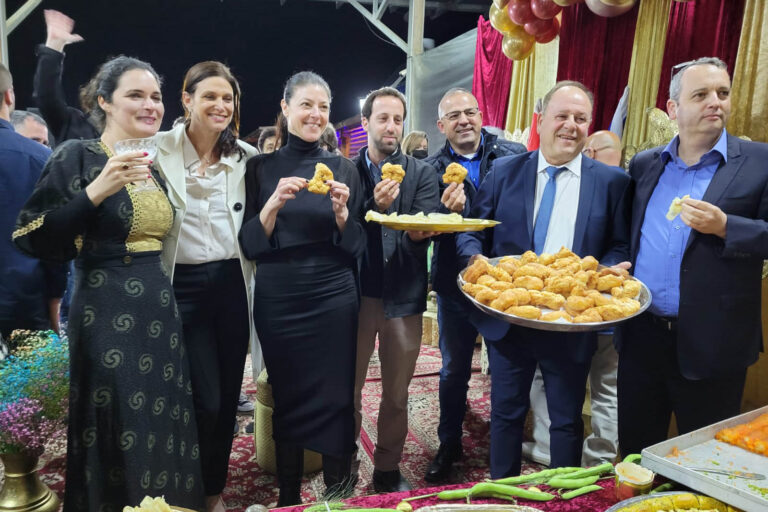
“We have a wall-to-wall coalition here. Here at the Histadrut, we have all the tribes of Israel and they’re all getting along just fine, we’re all friends here. That’s another thing the media overlooks. And it’s something I take great care to uphold.
“I’m very particular about everyone having free speech here, and I do mean everyone. I’ve seen that during the election too. At the federation’s committee we’ve seen the partnership, the friendship, the solidarity, between members of all parties, around a shared interest. That’s how the country should be run as well. Less bickering, less scheming about how to get elected, and less endlessly dissolving themselves every six months.
“The only stable entity in Israel for quite a few years now has been the Histadrut. Just realize what a role reversal that is. And that’s our pride, that this home founded 101 years ago is now more relevant than ever. More inclusive than ever. We have all of Israeli society. Big cities, small towns, public sector, business sector, they’re all here.”
Are there populations you’re having more trouble reaching?
“It’s really difficult to get into the high-tech world. I’ve said before that right now everything in high-tech seems fine and dandy, but when prosperity suddenly comes to a grinding halt, when people start realizing that life is about more than just money, that there’s also one’s social benefits and home life and even some quality of life – there may be an organizing revolution in high-tech as well.”
Is the high-tech crisis an opportunity to be used to benefit labor organizations?
“That’s not really where I set my sights; we have enough worlds to expand in. I’ve set an objective for my staff, for the union and precinct leaders, to get to one million Histadrut members in the next five years. And we’re well underway. At the time of the previous elections, in 2017, we were 600 thousand. Today we’re 800 thousand. envision the Histadrut growing, evolving and expanding its membership.”
“I’m not here to form a workers’ party”
Have you thought about going into politics?
“I’m familiar with the Knesset and with politics, and I couldn’t be there for even a minute”.
Why?
“It’s not a place that generates things. What we’re doing here is more important than what’s being done anywhere else. The federation’s power is greater.”
Maybe we need a workers’ party. There seems to be a vacancy in that area.
“I’m not here to form a workers’ party. I’m a veteran of ‘Am Ehad’ [the party formed in the past by former Labor Party leader Amir Peretz when he was chairman of the Histadrut]. I used to consider it once. Today we’re large and strong and are able to manufacture our own power anywhere, within any party, and generate a defense.
“When you form a party and that party gets 4-5 Knesset seats, if any, then those seats restrict you, and that’s where the story ends. That’s why I don’t want to quantify this into partisan political power. I think that wouldn’t be right.
“The tapestry we’ve woven here, of people from all parties being together, that’s the power of the New Histadrut. I will go on leading it. This is unlike other unions around the world that are usually affiliated with a single party.”
“Everybody knows I can shut down the country with two phone calls”
From time to time there are MKs who bring up the option of restricting workers’ right to strike. Research institutes and opinion makers from the deep economic right, such as Kohelet Forum, feed such ideas to MKs and elected officials.
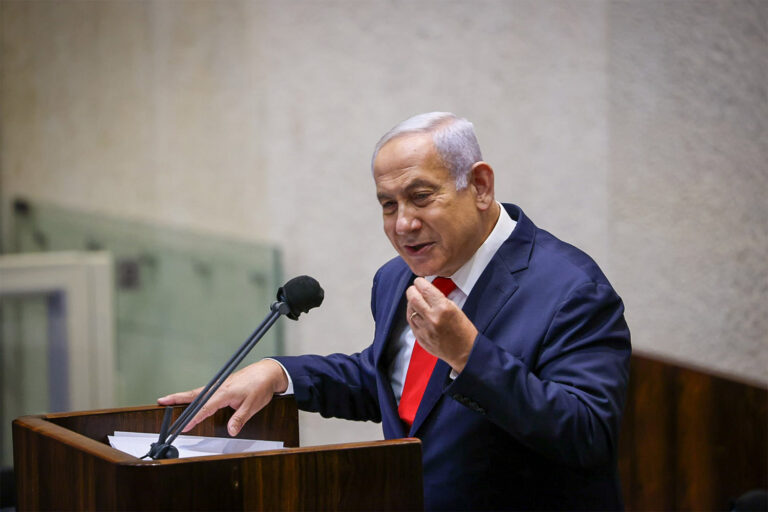
Is the right to strike currently under threat in Israel?
“There was a threat in 2019. Today there’s no threat to the right to strike. I’ve taken that off the agenda in all parties."
There are MKs on behalf of Kohelet who are trying to restrict that right.
“There always have been. But they’re of very low importance. The Histadrut is in the Knesset today with plenty of people. We have people in all parties and at all Knesset committees. We have the Self-Employed Workers Forum which is affiliated with us on everything related to self-employed workers; we have the Arlozorov Forum research institute which we founded as a counterweight to Kohelet’s activists. We have an acting chairman of the Histadrut, Roei Yaakov, who runs the office for coordination with the Knesset, he’s there with lots of people. We’re very strong there, more than we’ve been in recent years. I’m not worried.”
Not even if Netanyahu were to return to power?
“I have to tell you I have plenty of friends at Likud, plenty of partners, and I can work with any prime minister. We’re calm. Everyone understands the Histadrut’s power. Everyone knows I can shut down the country with two phone calls. Everyone’s clear on that.”
“I worry that the future generation might flee this place”
Bar-David is concerned by the economic reality experienced by young people in Israel; such as in the housing field.
“This bothers me a lot,” he says. “Governments have failed to address the housing crisis for years. We have to give young couples hope that they’d be able to buy an apartment.”
How?
“We have to provide them with a lot more financing. 90% of the mortgage. Eventually they have to go to the private market and take out loans. Why shouldn’t the state give a young couple who are looking to buy their first apartment a state-guaranteed deposit?
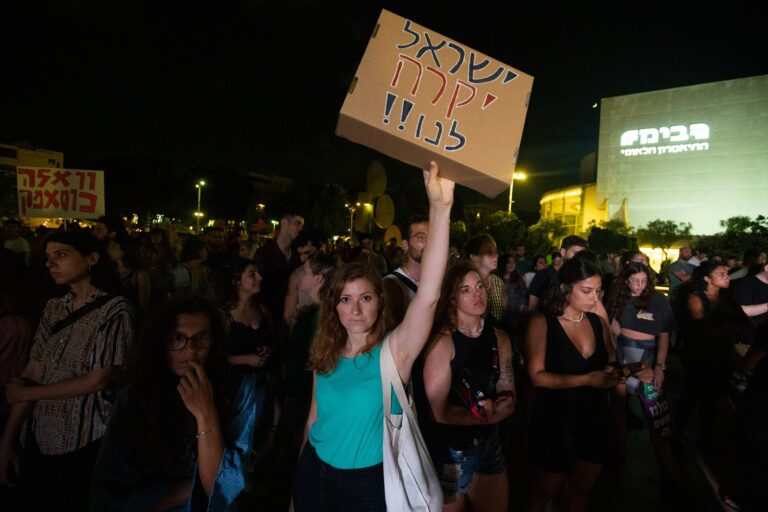
“Couples once had an entitlement to a first apartment. I’m not looking to turn back the clock, but it’s something the state should take care of. Free up more land. See how you can construct neighborhoods with affordable prices. You can also give a 90% loan in places the state wants people to go live in. I worry that the future generation might flee this place, because in other countries an apartment costs half as much. That’s outrageous. The state should reach into its pocket and provide financing.”
“We need our Ministry of Finance to be slightly less capitalist and slightly more compassionate”
How would you define yourself ideologically?
“I’ve always been a social democrat. That doesn’t change for me. Israel needs to be more of a welfare state. It needs to spend more on all welfare products. Investments have steadily gone down these past few years. Ultimately, if you spend more on education, housing and health, you’ll have less to spend on welfare institutions. Someone needs to just start allocating the money properly.
“In a certain sense, we’ve somewhat neglected the welfare state that had been built here. We’ve gone too far toward the other extreme of the private market. There are Scandinavian welfare states; we ought to learn from them, what it is they do, how they work. We can learn a lot from Germany on how to run both a welfare and a housing economy. We have things to learn and adjustments to make so that they could be implemented in Israel.”
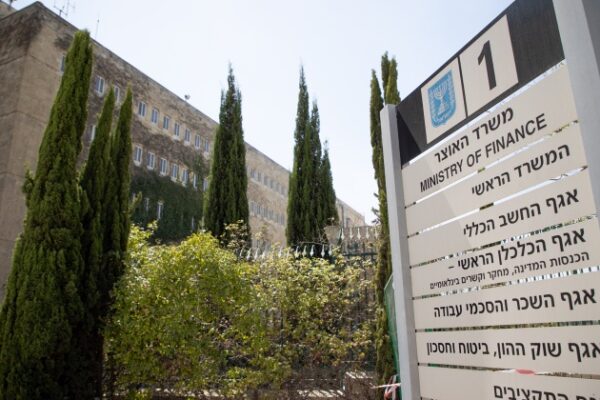
Israel has budget surpluses in the tens of billions. Does it upset you that the Ministry of Finance won’t release those funds for the pressing needs?
“The Ministry of Finance is not exactly homogenous. There’s the Budget Division that holds the money, keeps the money and won’t permit any expenditures to be made. They’re always preparing for the next crisis. But the crisis is already here. It’s here right now, it exists. There’s no need to wait for the next one. People here are just about ready to collapse.
“We need to start putting our investments back into people. That’s what the state is for. If gas prices go up, that should be curtailed; and if product prices go up, more products should be placed under control, to ensure that their prices don’t go up.
“The state can do a lot if it wants to. It has the tools. Except someone over there is obstructing it, and that makes me really angry. But I also have partners at the Finance Ministry whom I know how to work with and generate reforms with, and that’s something I’m really proud of.
“Once I finalize the railway agreement, I’ll have been done with all of Israel’s biggest reforms: the Electric Corporation, Mekorot Water Company, the ports and the Israel Railway. All this was done in my tenure. These are things that have dragged on for the past 20 years. Eventually we’ll have an operating, running train service here. You can’t compare today’s trains to those of 30 years ago. People are taking the trains today. So there are also steps I’m able to take with the Ministry of Finance.”
Why are the Budget Division people so stingy? Don’t they see what people living here are going through?
“Like we have our DNA, so does the Ministry of Finance. It’s a third generation clinging to the same fiscal policy. ‘Keep the money’, ‘introduce restraints’, ‘raise obstructions.’ Take for example the inquiry into the Carmel fires. Before the disaster, there’d been a recommendation to establish an airborne firefighting squadron. One of the budget execs at the Budget Division wrote that that was unnecessary. She prevented that on the grounds that there wasn’t any money for it, that it wasn’t needed, that it wasn’t economically feasible.”
People burned to death.
“So we see that at the end of the day, the most critical decisions in Israel are made at the Ministry of Finance. That’s where the budgets are. That’s also where the decisions are made. They’re the ones who ultimately decide whether or not something is economically expedient, whether or not it’s feasible. If we want to have a train line to Eilat, it eventually comes to the Ministry of Finance to decide. If we want to build another hospital in Beersheba, the Ministry of Finance will decide.
“We need our Ministry of Finance to be slightly less capitalist and slightly more compassionate with the country’s citizens. That’s what I expect of the Ministry of Finance. There are certain indications, I can see that in the reforms I sign, but they’re still too stingy and need to release more.”
“The statesmanly approach is the approach that won”
Bar-David has been serving as chairman of the Histadrut for the past three and a half years now. In 2019, he was elected by the federation’s house of representatives to replace Avi Nissenkorn, and in May 2022, he was elected directly by approximately 200 thousand of the total 250 thousand voters, about 80%. The elections period, which took place over several months, was a turbulent one, but Bar-David also considers it the most emotional moment of his tenure.
“I don’t usually get too worked up”, he says. “Certainly whenever I sign an agreement there’s a kind of a thrill. But there was an especially moving moment at the close of the elections: the moment when the results were announced, on May 25 at 02:00 AM. That was one of the most emotional moments of my life, if not the single most emotional one. And the most impactful.”
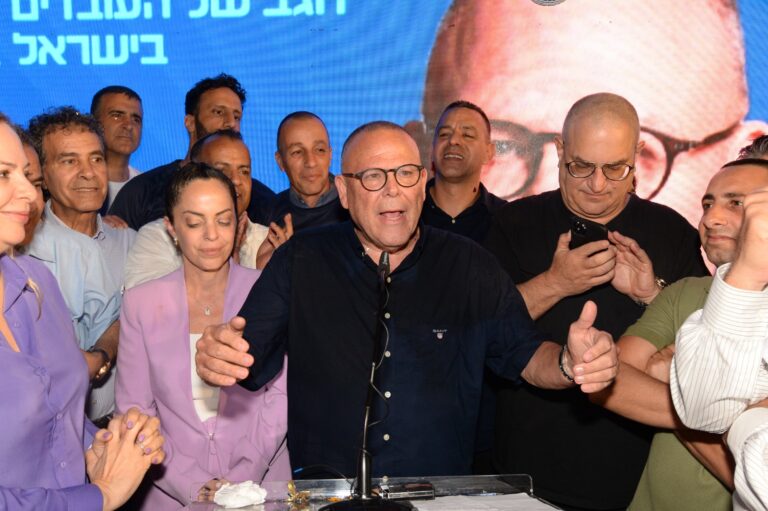
Why is that?
“In a single moment you realize you’ve made history, and you’re also finally getting recognition and love for your work in such a hard position. There aren’t many moments of satisfaction in this job. One week later, you’re already plunging into arduous work from dawn till dusk. That was a truly special moment that distilled the entire recent period into a single second.”
How do you explain your landslide victory?
“My way won. I feel that the workers understand that the Histadrut today is something different, that it needs to broadcast a different image. And the statesmanlike, responsible, leadership approach we all adopted was the approach that won.
“Workers don’t want to think of the Histadrut as some kind of street brawler strutting around with tires and loudspeakers all day, screaming to high heaven but producing no results. Workers understand just fine that this is an entity that represents them properly during a time that is very difficult all over the world.
“Even in that period, we’re nearing 800 collective bargaining agreements signed in both the private and the public sectors. Agreements that have promoted hundreds of thousands of employees, and many dozens of sectors that we can be proud to have promoted during such times.”
Will you be running for yet another term at the Histadrut?
"I’m only just starting a term. If everything goes well, then yes.”
How does one stay human with all those politics, the use of power, the struggles?
“I’m a people person. I’ve been leading people since I was in the youth movement. That’s my DNA. I love people. You can’t do this job without people. That is something I’ll never lose because that’s who I am. And that’s what I’ll do until my last day here.
“At the Histadrut, we’re leading great changes in many fields – in the field of member services, our consumer clubs are fighting the mounting cost of living. I’m going to invest even more in the ‘Together for You’ club, through which the consumer who is a Histadrut member can make purchases at considerably lower prices.
“We’ve established the ‘Friends’ club chain (formerly ‘Mofet’ halls). It’s a resounding success. We opened it in May and already tens of thousands of tickets have been sold. We’re bringing culture to Israel’s periphery at affordable prices.
“Next week, I’m going to the opening night of a theater production performed for the first time in Yeruham – ‘Spanish Orchard' (Bustan Sephardi), and will attend it with Noam Semel, CEO of Habima [Israel’s premier theater]. It’s part of my vision, to bring the services to our members. We are constantly expanding and evolving.”






